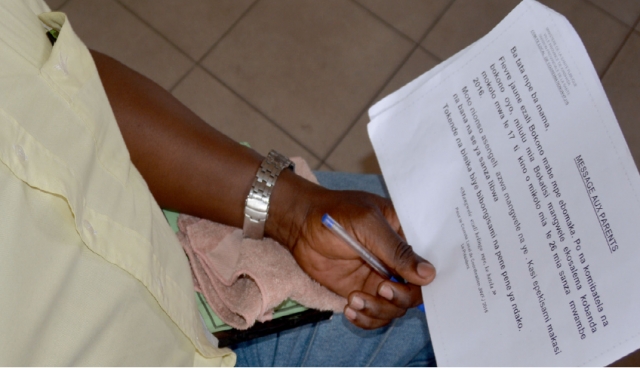Community mobilization and engagement accelerating ahead of yellow fever prevention campaign in Kinshasa
 KINSHASA, 14 August 2016 -- Capacity-building and community engagement by district chief medical officers and community organizers in Kinshasa’s 32 health districts gathered pace on Friday 12 and Saturday 13 August in the city and province of Kinshasa, ahead of the planned launch of the mass yellow fever preventive immunization campaign in Kinshasa on Tuesday 16 August at Assossa field in the community of Kasa-Vubu.
KINSHASA, 14 August 2016 -- Capacity-building and community engagement by district chief medical officers and community organizers in Kinshasa’s 32 health districts gathered pace on Friday 12 and Saturday 13 August in the city and province of Kinshasa, ahead of the planned launch of the mass yellow fever preventive immunization campaign in Kinshasa on Tuesday 16 August at Assossa field in the community of Kasa-Vubu.
Risk communication officers from the Expanded Programme on Immunization (EPI) at the national and provincial level conducted briefing sessions on the coordination and preparation of campaign activities for district chief medical officers, and provided coaching in techniques to encourage social mobilization and community engagement.
“Today we brought together 75 community organizers, including ourselves, all members of the task force on yellow fever risk communication, social mobilization and community engagement. At our briefing we dealt with a range of topics like community-based surveillance, promoting essential family practices, and the minimum protective dose against yellow fever,” explained Telly Dibindukidi, the yellow fever focal point and social mobilization officer from the national EPI office.
The Expanded Programme on Immunization, which is supported by WHO, UNICEF and other partners, has publicized the key messages of the preventive immunization campaign through posters, lists of action points and other communications media. “Each of the 32 health districts received 10 copies of the standard messages for dissemination in places of worship around the capital,” he added.
For him, “This Sunday, 14 August, is really important because the awareness-raising messages about the minimum protective dose for yellow fever will be read out in all places of worship. Afterwards, the message will be put out by community radio stations, especially the ones at big central and outlying markets, for example the radio station at the market in Matadi-Kibala, in south-west Kinshasa, in its daily programme called Interactive.”
Previously, the yellow fever communications task force team had supported a similar awareness-raising exercise for district chief medical officers and supervising nurses, who went through their own training exercise on Friday. “Unlike previous campaigns like the ones against polio or measles, this one has really taken off,” says Jimmy Marcello Dibanzilua, the social mobilization officer from the provincial EPI office in Kinshasa. “People are impatient to take part in the preventive immunization campaign, because this time they know that everyone will benefit”.
“Careful targeting is really important,” says Jacques Kiawila, a community organizer from the Mont-Nagfula II health district, one of the biggest in the capital covering more than 100 square kilometres and bordering on Kongo Central province.
“Throughout the week, we have had a hectic round of meetings with local chiefs, religious leaders of different denominations, service providers and chairpersons of health district development committees, stallholders and trade associations of taxi- and motorcycle-taxi drivers,” he says. “We explained to them that the full dose of yellow fever vaccine is for children between 9 and 23 months, while adults will get the minimum protective dose.”
To ensure that things are as simple and clear as possible during the campaign, which in practical terms will use the fixed immunization strategy, “we have also explained the workings of a site that focuses on two different groups, namely persons requiring a full dose that gives lifetime immunity, and persons who will be given a minimum preventive dose that will last 12 months, it being understood that the latter will receive a further dose in 2017, as the authorities have promised,” explains Jacques Kiawila, who notes “the genuine buy-in and increasingly constructive community engagement in this area.”
_____________________________________
Media contacts:
Eugene Kabambi
Communications officer
Tel. +47 241 39 027
E-mail: kabambie [at] who.int (kabambie[at]who[dot]in)


